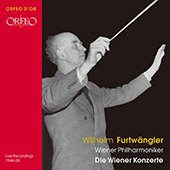Paul Badura-Skoda
Paul Badura-Skoda intended to become an engineer but, after hearing an Edwin Fischer recital, decided instead to become a musician. He had begun piano lessons at the age of six, and his mother’s second husband (Skoda) supported young Paul’s decision to enter into the field of music. At the Vienna Conservatory he studied piano and conducting under Viola Thern. In 1947 his prize upon winning the Austrian Music Competition was a scholarship to attend master-classes in Lucerne given by Edwin Fischer, who influenced Badura-Skoda’s playing. In the same year the young pianist made his debut with the Vienna Symphony Orchestra; in 1948 he gained second place in the Liszt Competition in Budapest, and, a year after that, third place in the Marguerite Long-Jacques Thibaud Competition in Paris. By the time he appeared at the Salzburg Festival in 1950 he had already performed with Herbert von Karajan and Wilhelm Furtwängler. Tours of Europe followed, and in 1951 Badura-Skoda made his London debut. The following year saw a tour of Australia as well as his debut in the USA, with the Cincinnati Symphony Orchestra. He made tours of the USA during the 1950s but after that played mainly in Europe, returning to tour the USA in 1978 and thereafter.
During the late 1960s Badura-Skoda was artist in residence at the University of Wisconsin. A highly respected teacher, musicologist, and editor of Urtext editions, he has written a book on Mozart interpretation with his wife Eva. He has a notable collection of early pianos, some of which he has restored himself, and has gained a reputation for performing and recording on these instruments. He also plays twentieth-century music, and the composer Frank Martin dedicated to him his Piano Concerto No. 2 (1970), which the two recorded together in 1971. Badura-Skoda recorded it again for the ASV label.
From Fischer, Badura-Skoda learnt how to produce a limited, sensitive range of sound and volume, but in the late 1950s this brought him adverse criticism: ‘…there is not much depth or range of colour to his tone.’ His style changed over the years and, although he was never a virtuoso, his recordings and performances of the Austro-German repertoire have earned him great critical praise. He has made many recordings, including the complete piano sonatas of Schubert, Beethoven and Mozart. His first recordings were made for the Westminster label in the 1950s: as well as much Schubert and Mozart there were also discs of Milhaud’s Five Studies for piano and orchestra, piano concertos by Scriabin and Rimsky-Korsakov, Schumann’s Carnaval Op. 9, and Brahms’s Sonata in F minor Op. 5. His Westminster recording of the Bach partitas has been reissued on compact disc, as have some Schubert recordings from 1958.
He has recorded Beethoven sonatas on a modern piano and also on instruments of Beethoven’s time, the latter in the late 1970s, of which Susan Kagan writing in Fanfare commented, ‘Badura-Skoda brings his usual reliable musicianship to these readings, observing details of the score with scrupulous care.’ He has recorded the Bach partitas on a modern piano (Westminster) and a harpsichord (Astrée). Although he had recorded the scherzos as part of a Chopin recital for HMV in the early 1960s and both concertos with Artur Rodzinski, in 1993 two discs were issued by Auvidis Valois containing the ballades and sonatas. One critic complained of technique interfering with the musical argument: ‘Badura-Skoda manages to get through the notes, but can’t shape them or give them the space they need to register.’
Badura-Skoda’s most recent major project was to record the complete Schubert piano sonatas on period instruments for Arcana. ‘This excellently recorded Schubert series offers an invaluable resource for assessing Schubert’s piano sonata output afresh in an “authentic” setting.’
In 2004 Kleos produced a seven-disc set entitled Paul Badura-Skoda: a man and his music consisting of previously unreleased material from 1943 to the present day. Included are Louis Gruenberg’s Six Jazz Epigrams Op. 30b, Chopin’s Études Op. 25 from a live recital in 1962, and Badura-Skoda’s seventy-fifth birthday concert given in the Brahmssaal of the Musikverein in Vienna in November 2002 where he plays Schubert, Brahms and Ravel’s Gaspard de la nuit.
© Naxos Rights International Ltd. — Jonathan Summers (A–Z of Pianists, Naxos 8.558107–10).

















